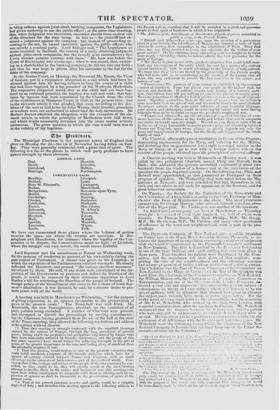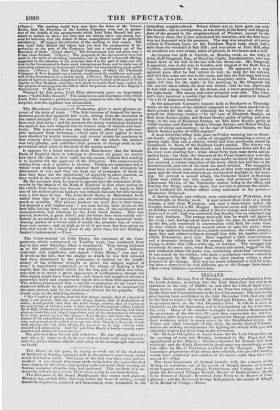A meeting was held in Manchester on Wednesday, " for
the purpose of giving expression to an opinion favourable to the preservation of peace at the present crisis." The Town-hall was well filled. Mr. Aiusworth, the new Boroughreeve, presided, on the condition of all party politics being excluded. A number of Chartists were present, and attempted to disturb the proceedings by moving amendments ; but the Chairman having promised them the use of the hall at the close of the Peace-meeting, they allowed the following resolutions and address to be carried without dissent.
"1. That this meeting is strongly impressed with the mauifold blessings enjoyed by the nations of Europe, through the long prevalence of general peace ; dulling which the prejudices and antipathies engendered by former wars bare been materially softened by friendly intercourso, tout the people of this Slid other countries have found leisure for achieving triumphs in the arts of peace, of far greater importance to the true and lasting glory of Mankind than the perishable trophies of war. "2. That this meeting would deplore as one of the greatest calamities that could befall mankind, a rupture of the friendly relations whiell have tor a quarter of century existed between Frame and England, with so much advantage to the interests of both nations, mul of the civilized world. Con- vinced that if the fixlings and wishes of the people of the two countries be eon- Rated, as they ought to be, they will equally revolt at the nil-Christian attempt to involve them in the crimes and horrors of war, this meeting calls upon their fellow countrymen to eoiiperate with them in offering such an ex- pression of opinion as shall he ftwourahle to the preservation ot peace at the present crisis.
" 3. That at the present juncture, reserve and apathy would be ft culpable neglect of duty; and therefore this meeting agrees to the following address to the French nation, confident that it will he accepted by a great and generous people in that spirit of frankness in which it has originated.
"The Address of the Inhabitants of Manchester, friends of peace, assembled in
public novting, to the French .,Valion.
" Friends and Allies—Ten years ago, upon the occasion of a portentous crisis in your history, the inhabitants of 31anchester deputed a body of their citizens to convey their sympathies to the inhabitants of Paris. gince that time, has tiny thing occurred to lessen our solicitude for the welfare of your great nation ? On the contrary, every succeeding year has taught us to value more dearly a friendship which, we believe, afibrds the Lest guarantee for the peace of Europe. e We should deplore as one of the greatest calamities that could befall man- kind, any interruption of the amity which has now for a quarter of a century existed between ue with so much advantage to the interests of both nations. 'We trust that ileee views are shared by the great body of the French people, who will ueite with us in considering as the enemies of the human race all those who may endeavour to involve the two countries in the crimes and horrors of war.
" Frenchmen—The prowess of your nation is established by the common consent of mankind. Fame has placed your people in the highest rank for bravery and fortitude. If military renown were worthy of a nation's ambi- tion, your fathers have left you nothing to gain in the pursuit of martial glory. To every generation is afforded a field of greatness—ours is the age of improve- ruent. Signalize yourselves, then, in the arts of peace ; they are infinitely more beneficial than the arts of war, and to excel in them is far more glorious. To subject nations to the permanent influence of your beautiful language, your science and philosophy, would be achieving far nobler and more lasting triumphs than are to be tound amongst the perishable trophies of war. " Friends and Allies—We are the advocates of a perfect freedom of corn- mem between all the nations of the world, and believe that war or conquests can confer no benefit upon any people. We call on you, then, to unite with us in the use of every honourable means to preserve peace and friendship between France and England, upon whose :till:thee so greatly depends not only the peace and improvement of Europe, but the liberty and happiness of the whole family of man."
'Fite Chartists afterwards passed resolutions in favour of' the Charter; deprecating impressment for the Navy, and balloting for the Militia, and declaring that no government has a right to compel service in the Navy or Army, or to go to war with a foreign nation, wthout the consent of the people, obtained upon the principles of universal suffrage A Chartist meeting was held at Monmouth on Monday week : it was called by two peripatetic Chartists, named Philp and Bolwell, from Bath ; who addressed the persons assembled (estimated at about two hundred) from the window of a house ; and at the conclusion of the speeches the people dispersed quietly. On the following day, Philp and Bolwell were apprehended, as they journeyed to Pontypool on their progress of agitation. On Wednesday they were taken before the Ma- gistrates at Newport ; and were ordered to find bail, themselves in 501. each and two others in 25/. each, for appearance at the Sessions, and for good behaviour meanwhile.
On Tuesday, the Society for the Extinction of the Slave-trade and the Civilization of Africa held a meeting in the Corn Exchange at Man- chester; the Dean of Manchester in the chair. The most prominent speaker was Sir George Murray, who avowed himself a zealous advo- cate of the Niger plan. D. Lnshington was another of the speakers. An Anti-Corn-law tea-party was held at Manchester on Thursday sennight : it co.e,isted of eisout eight hundred, ono half of whom were females. Sir Thomas Potter, Mr. Mark Phillips, M.P., Mr. Gregg, ALP., Mr. Brotherton, M.P., Mr. Cobden, and many other gentlemen of influence in the town and neighbourhood, took a part in the pro- ceedings.
The Plymouth Company of New Zealand gave a public breakfast on Friday last, at the Royal Hotel Assembly Rooms, Plymouth, to ce- lebrate the departure of an expedition conveying a number of emigrants with the Chief Commissioner to the Plymouth Company's settlement in New Zealand. This fate is described by the Dcr,mport Independent as one of the most brilliant and spirit-stirring that ever took place in those parts. Four hundred invitations were distributed by the Com- mittee, and time attendance fell little short of that number ; com- prising the alit° of the neighbourhood and the adjoining counties and a large proportion of ladies, without distinction of politieal parties. The Chairman was the Earl of Devon. Chairman of the Cennuittee on New Zealand in the House of Lords: and the first of the speakers was I.ord Eliot, the Chairman of the Commons Cennnittee on New Zealand, Sir William Molesworth, the Chairman of ti.e Conine:els Committee on Transportation, and one of the Direeters of the London Company. de- livered a verY able and impressive discourse on the general subject of colonization, its theory and vast utility ; whieb was listened to by the mixed audience with an attention that showed how great an advance the subject must recently have made in publie appreciation. But the really novel an.1 intrirtant point in the proceedings, was the statement of Mr. E. G. Widietield, who arrived by the mail from London, with a. special communication, after the epeeking had begun. Mr. Wakefield announced that the disputes between the Government and the parties who were eneeged in endeavouring to colonize N.nv Zealand were at an end. He was not as yet in a position to es:lir:elide:no details, but the settlement of all differences with the Government had taken ;,laee. Mr. Wakefield read the following letter, whieh the Chairmm of the New Zealand Company in London had received from one of the under Se- cretaries of State for the Colonies- " Sir-1 am directed by I. ,r .1 !r. r i- ennsideritiini viou li.tte, -: •' hare hithorto iiven .i.,:otlat,•,1 ,i• you inquire in %OA Ik!lu iiio i ; Company. and on iiii•.1 I.•ta,
anisette toiisttmom . t ..
ouvrations.
en 'zap.,ssibi,.,
4. In eousequon, .•': !. : ,it. this periA tO retia,, I .. 1 1-l.i.11‘,1 by his Lordship to si.it,.. tii•ki , , i . •• i, .‘,.,.,.!:111,t,t‘i..iL.,,, y .„, :tn.! iIi hi,,,,i,..,ii.,,, , ihii ,iiiiiti.„„ ,vill iiiii , i: i . . your ni...i.c . ,,,,• .u. R. V, :•.; r.: - .l.t Mr. Wak:ii:lil. who deserved
The Directors of the Loathe
some credit for caution :1, MOH n, !4■,!11. ,,. !T,r prudence as well as courfigt... bad authorized him Mr. Wakefield) to state that they were cutirely salts cut with the aurport of this Litter, and fully expected that arraiik:ements would, be immethately made by which all the questioas in dispute would be set at reste . ICY his
• ,,i who • ,. which .1 y the
.ou their niture
(Cheers.) The meeting would have seen from the letter of Mr. Vernon Smith, that the Directors of the London Company were not in posses- sion of the details of the arrangements which Lord John Russell had pro- mised to submit to them; but they bad one among other very strong rea- sons for believing that the details of those arrangements would be perfectly satisfactory. He begged the attention of the meeting to that reason. The step Lord John Russell had taken, had not been the consequence of im- portunity on the part of the Company, but was a voluntary act of the Secretary of State. (Loud cheers.) The Government had not given way— it had come forward. (Cheers.) The proposals of the Government were not made in the spirit of unwilling concession, but in that of a free-will offering, suggested by the adoption of the principle that it is the part of duty and wis- dom in the Government to foster such enterprises as these, and to make use of colonizing companies as instruments of the state for accomplishing great public objects. (Cheers.) The NOV Zealand Company, of which the Plymouth Company of New Zealand was a branch, would meet the confidence and good- will of the Government in a similar spirit. (Cheers.) They had already, in the course of fourteen months, despatched 2,274 persons to their settlement of Wel- lington in New Zealand; and they were about to double their large capital, for the purpose of carrying into the fullest effect the present views of her Majesty's Government. (" Hear, Fear!") Warmed by this news, Lord Eliot afterwards gave an impromptu toast—"Lord John Russell." The suddenness and heartiness with which Lord Eliot toasted a political opponent, seemed to take the meeting by surprise, and the applause was unbounded.



























 Previous page
Previous page